If you run a business or keep an eye on your finances, chances are good that you have heard of Quicken Vs QuickBooks. These are both incredibly powerful pieces of technology that help simplify your money life — but when it comes to picking which one is right for you, the answer isn’t always clear.
But here I’ll share with you information about these two programs and compare them for you, so that you can decide which is best for your situation.
Short of shrinking yourself down and visiting them firsthand, the options are organized more or less in order based on your business model — perhaps you’re a freelancer, small business owner or self-funded entrepreneur seeking to streamline financial management (and more importantly, they’re not offering white-label solutions for multinationals).
I’ll go over the key features and pros and cons of each below so you can figure out which might be right fit for your needs.
Quicken Vs QuickBooks: An Overview
What is Quicken?

It is built for personal financial management, but can also be used by freelancers and small businesses. It includes a variety of abilities to help users log expenses, get control over their budget, and plan for future financial success. It can also be the tool you use to manage everything from your spending to investing and even your taxes.
Key Features of Quicken:
• Expense Tracking: Automatically categorizes expenses and generates reports, so you know what you’re spending on.
• Bill Payment: Quicken can assist you in staying on top of paying your bills, so you never miss a payment.
• Investment Tracker: Track your investments, analyze and meanwhile make decisions with them based on their performance.
• Budgeting and Forecasting: Quicken allows you set budgets and forecast future spending based on your history.
• Tax Planning: Quicken creates tax reports to make it easy for people to get ready for tax time.
Who Should Use Quicken?
•People seeking an all-in-one personal finance tool.
• Freelancers and solopreneurs who want to organize business and personal expenses together.
• Those in the market for a budgeting tool with robust reporting.
What is QuickBooks?

While QuickBooks is more designed for small businesses, accountants and entrepreneurs. It provides strong features for handling business finances, from invoicing to payroll to tax filing. Though it is full-service, Pixis finds its niche in facilitating business instead of personal finance.
Key Features of QuickBooks:
• Accounting: QuickBooks does much of your accounting for you, such as making journal entries, and reconciliation, preparing accounts for financial statements.
• Invoicing & Payments: With QuickBooks you can send custom invoices, track payments and even take payments online.
• Payroll: QuickBooks makes payroll easy with built-in solutions like direct deposit, tax calculations and forms, and compliance management.
• Financial Reporting: QuickBooks comes with over 100 standard financial reports, which can be generated automatically; these reports display your businesses financial health in just seconds.
• Tax Submission: QuickBooks makes submitting taxes simple by helping you organize information for local, state and federal filing.
Who Should Use QuickBooks?
• Small to midsize businesses in need of an all-in-one accounting solution.
• Business owners who require more advanced features — payroll, tax filing.
• Those in search of pro-grade accounting software to scale up their business.
Quicken Vs QuickBooks: Differences
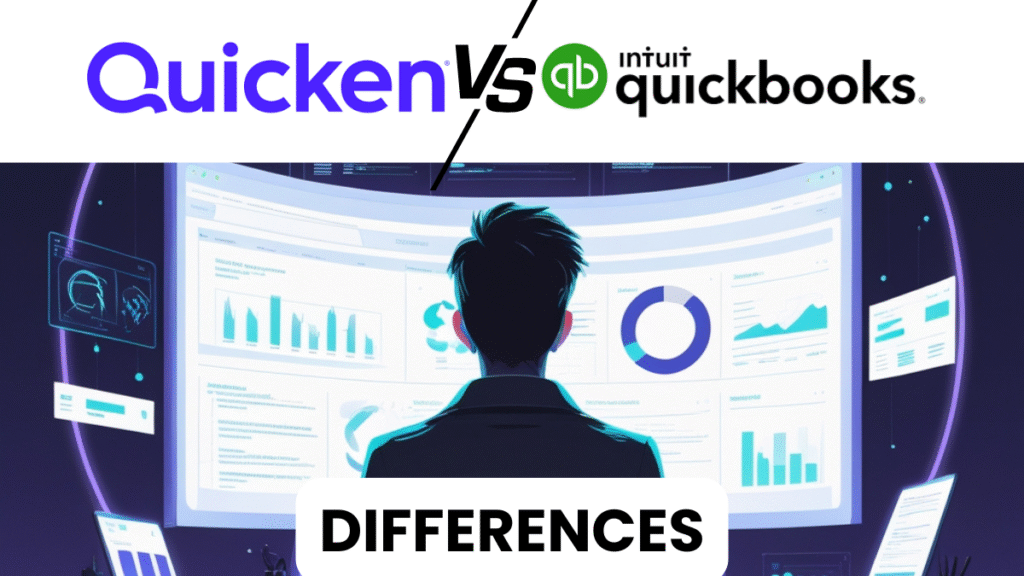
Quicken and QuickBooks are both financial management software, but they have significant differences. These distinctions are primarily based on target user profile and functionality complexity. Let’s break them down:
Target Audience
• Quicken is software for personal finance management as well as basic business accounting.
• QuickBooks is designed for small business, accounting professional, and entrepreneur who want to purchase an affordable but professional grade finance application that will handle all aspects of business finances from receivables to payables.
Features and Functionality
• Quicken is strong in personal finance tools and budgeting. It has more personal focused features like investment tracking, bills payments and tax planning.
• QuickBooks has a full suite of business accounting tools, and offers advanced capabilities such as inventory management, payroll processing, financial forecasting and detailed financial reporting.
Pricing
• Quicken’s plans are generally cheaper than QuickBooks’, and the lowest price point is also lower. It’s perfect for singles or anyone on a budget.
• QuickBooks is more expensive, but has a far richer set of features that would be helpful for businesses needing more than basic accounting. Prices differ depending on the plan you select: self-employed, small business and growing business.
Tax Features
• Quicken offers rudimentary tax features — monitoring expenses and reporting — which can prove beneficial for individuals or freelancers.
• QuickBooks has more comprehensive business tax filing capabilities, with features such as payroll tax calculations and quarterly tax payments as well as tools for fulfilling taxes.
Support and Customer Service
• Quicken provides support both online and via email and phone, yet it might not be as complete or responsive a service offering as is QuickBooks.
• With more than a decade under its belt, QuickBooks is known for top-tier customer service including live chat, email and phone support, plus community forums. QuickBooks is widely known for its extensive resources for accountants.
Advanced Features in QuickBooks:
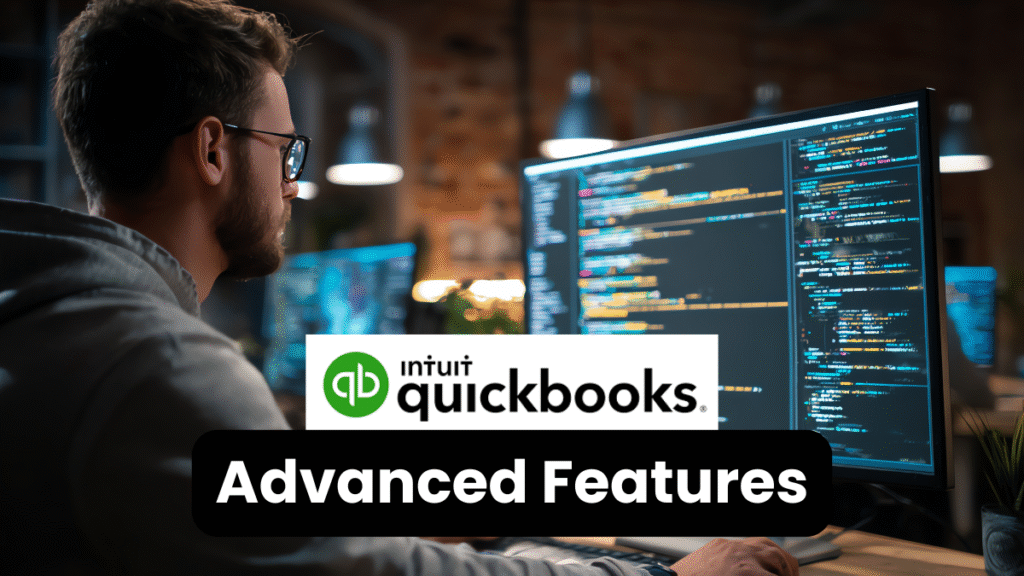
If you run a business, though, it’s the advanced features of QuickBooks that make it shine. Here are some of those powerful tools, with a little explanation.
Payroll Solutions:
QuickBooks has built-in payroll functionality that makes it quick and easy. You’ll be able to process payroll with just a few clicks, make tax calculations and get your filings done for you — all in compliance. Whether you are paying yourself or your employees, QuickBooks makes it easy.
Inventory Management:
QuickBooks has inventory management features that keep you up to date on how much stock you currently have and handle orders while even notifying you when it’s time to reorder certain stock so you never run out of what’s needed. It’s an awesome feature for those selling physical products.
Mobile Accessibility:
Keep your business finance operations from anywhere with QuickBooks mobile app. You can invoice clients, track expenses and look at financial reports — all on your phone. This is ideal for business owners that are always on-the-go.
Integrations:
QuickBooks has hundreds of third-party app integrations, so it’s simple to build out your workflow. Whether you want to connect your eCommerce platform, CRM or payment processors with QuickBooks it has the integration solutions for your business.
Time Tracking:
Service-based businesses are able to track billable hours for employees and contractors using QuickBooks. This feature is particularly useful for consultants, freelancers, or any kind of job that requires accurate time tracking for invoicing.
Quicken Vs QuickBooks: Ease of Use
How easy it is to use can truly be a deal-maker or -breaker between Quicken vs. QuickBooks. Here is a closer look at the user experience on both platforms.
Quicken Usability:
• Easy to Use Interface: Quicken is reputed for its friendly and easy to use interface. It is built for people new to finance software, so it is simple to use and navigate.
• Streamlined Features: Quicken trims down features. There’s a lot on offer but it doesn’t bombard you with too much choice. The emphasis is on managing personal finances, so the learning curve should not be steep.
QuickBooks Usability:
• Powerful but Complicated: QuickBooks is far more feature-rich and, while this provides a lot of power and flexibility, it also makes it more complicated. If you’re not already familiar with accounting software, there’s a bit of a learning curve.
• Good Support Resources: QuickBooks provides good support documentation, tutorials, and customer service (though I should point out, most of the best business accounting software I’ve tested have much worse support resources than QuickBooks).
Quicken Vs QuickBooks: Integrations and Add-ons
With integrations, QuickBooks is able to outclass Quicken. It can also be connected to accounting & invoicing, CRM, e-commerce and payroll solutions. This is important for companies that want to integrate their accounting data with other software systems.
Quicken, on the other hand, is more restrictive with integrations. Although it is able to integrate with your bank account and credit card, it does not have the same depth in integration with business tools. But that’s okay for personal finance control, where more advanced integrations may not be required.
Quicken Vs QuickBooks: Pricing Plans Breakdown
Quicken Pricing Plans:
• Starter: Approximately $35/year – Great to get started with personal finance management.
• Deluxe: Approximately $50/year – Great for those who need more advanced tracking and budgeting capabilities.
• Premier: About $75 a year – Offers tax planning and investing tracking, ideal for people with slightly more complicated financial situations.
• Home & Business: Approximately $105/year – All of the personal finance features plus simple business expense tracking.
QuickBooks Pricing Plans:
• Self-Employed: Approximately $15/month — Ideal for freelancers and independent contractors.
• Simple Start: Approximately $25/month – Recommended for start-ups and small businesses.
• Essentials: $50/month or so — Payroll help and time tracking for small teams.
• Plus: About $80/month — The best option for growing businesses requiring full accounting features and the most advanced inventory system.
• Pro: About $180/month – A robust plan for bigger business and enterprises.
Quicken Vs QuickBooks: Which Software Is More Scalable?
As your business expands, the demands for solid financial software will become greater. This is where QuickBooks excels. It is scalable that can cater business at any stage i.e. startup to large enterprise. If you aim to grow, QuickBooks will still be a perfect fit.
Quicken, on the other hand provides software that is aimed at both individuals and small business owners while it will generally also work for freelancers or very small businesses, those with growing companies may find its resources lacking. It doesn’t have QuickBooks’ scalability, so it might be more challenging to keep track of a business that grows quickly.
Quicken Vs QuickBooks: Which Is Best For You?
If you’re actively tracking your personal finances, then Quicken is a good option. For freelancers or anyone running a small business with uncomplicated accounting needs, Quicken provides tremendous value. But if you’re growing a business or you want features beyond simple invoicing and estimates — payroll, inventory management, tax filing, etc. — QuickBooks is the hands-down winner.
I know — selecting software is a big decision, and you want to make sure it’s the right one for your financial goals. With any luck, you have what you need from this guide to make an informed decision.
If you have any additional questions, or would like some guidance as to which software you feel is more suitable for your business, please do not hesitate to contact us at. Happy accounting!
Click here to read my content on Sage Vs QuickBooks.
FAQs
-
What is the primary distinction between Quicken Vs QuickBooks?
The main distinction between Quicken and QuickBooks is who the product was created for, and what features they offer. Quicken is a money management program developed and published by Intuit, suitable for personal finance purposes and small business. For its part, QuickBooks was designed for small businesses and entrepreneurs providing full business accounting services such as invoicing, payroll, financial projections and tax filing among others. If you need a solution for accounting, QuickBooks is superior. That said, if you are a self-employed person or freelancer and have basic business requirements to manage finances then Quicken might be the better fit.
-
Which is better for small business accounting, Quicken Vs QuickBooks?
QuickBooks is the best QuickBooks win for small business accounting. It’s built for small businesses and includes advanced accounting capabilities such as payroll management, invoicing, inventory tracking and tax preparation. QuickBooks has strong features which are perfect for small and medium-size businesses, but they’re also scalable so your software can grow as your business does. Quicken is meant for personal finance management and small-business financial accounting, but it does not have the complex accounting tools necessary to grow and manage finances efficiently within a business.
-
Is Quicken appropriate for freelancers or the self-employed?
Yes, Quicken works for freelancers and self-employed people who want to stay organized in one place with their personal and business finances. It has Expense tracking, budgeting, and tax reporting make Quicken the perfect companion for all of life’s phases—from student to super saver. Quicken Home & Business is built to help freelancers track business income, expenses, and even personal finances separately. But if you need simply more of the advanced features for business accounting like invoicing or payroll, QuickBooks is a better choice.
-
Can QuickBooks do payroll for my small business?
Yes, when it comes to payroll your business QuickBooks is able to take care of business. QuickBooks also provides payroll capabilities built-in where you can completely automate payroll processing, calculate your taxes and even file the taxes on your behalf. It can handle direct deposit and paper checks, and it includes forms you need for make filings – like W-2s or 1099s.Not only does QuickBooks support all these features but it has various payroll options to keep your business in compliance with local, state, and federal tax laws so that any company of any size can use this friendly software.
-
What are the Quicken Vs QuickBooks Pricing plans?
Below is a price comparison chart for both tools:
• Quicken offers the following pricing:
o Starter: Approximately $35/year for simple personal finance tracking — which seems fairly reasonable.
o Deluxe: Approx $50/year with superior budgeting capabilities.
o Premier: About $75/year and offers investment tracking and tax planning.
o Home & Business: Approximately $105/year, for freelancers and small businesses.
• QuickBooks offers the following pricing:
o Self-employed: About $15 a month, for freelancers with minimal needs.
o Simple Start: Starting at $25/month (for very small businesses that have simple accounting).
o Essentials: Approximately $50/month, with payroll and time tracking.
o Plus: Approximately $80/month, includes inventory management and project tracking.
o Advanced: Approximately $180/month, for bigger companies in need of comprehensive accounting tools.
With an annual plan for Quicken, and a monthly subscription of QuickBooks, the difference would be that Quicken is the cheaper option. -
Does Quicken have tax tools like QuickBooks?
Yes, Quicken provides rudimentary tax tools needed for small business owners and individual filers like tax reports, tracking of deductions or creating the necessary forms for their income tax. But QuickBooks provides more robust tax features, especially for businesses. Tax tools on QuickBooks include payroll tax calculations, sales tax, and filing your quarterly taxes. If you’re an individual or freelancer in need of a basic tax program, Quicken might be enough; If you’ve got more advanced tax needs for your business, then QuickBooks is the better tool.
-
Can you use QuickBooks for personal finance?
QuickBooks is geared toward business finance management, and while it can probably be used to manage personal finances, I’m assuming you are dabbling in a side business or gig economy job. But it’s not as focused on personal budgeting features and investment tracking as Quicken. If your main concern is overseeing your personal finances (like budgeting, investing and preparing for the future), then Quicken takes this a step further. QuickBooks is ideal for those in search of more features beyond personal finance, but it will help you to include some aspects of your personal finances.
-
What are basic characteristics of QuickBooks for a small business?
Quickbooks Large small business solutions that simplify your work mes all they: 8/24-hour direct deposit, expert product support, mileage tracking.
• Billing: Create invoice and get paid online.
• Payroll: Run payroll, calculate and file payroll taxes.
• Track Expenses: Categorize expenses, add receipts and store important documents.
• Tax Reporting: reports for profit & loss, balance sheet and cash flow helpful filters not available under the normal financial report.
• Tax Filing: Automatically calculate your tax liabilities and manage both sales tax and income tax.
• Stock Management: See the stock levels of your products and re-order them when it is necessary.
• Time tracking: Record billable hours for clients or employees and good for service-based businesses.
QuickBooks is a powerful option for small business owners who require an accounting system that can do it all. -
Is it possible to connect QuickBooks with other systems?
Yes, QuickBooks integrates with more than 650 third-party applications. These integrations enable you to connect QuickBooks with multiple software systems such as eCommerce, CRMs, payment gateways, inventory managers and time trackers. Some of the most popular integrations include PayPal, Shopify, Square, Trello, Zapier and G Suite. SUCH FLEXIBILITY aids companies to have a smooth workflow between various platforms by keeping their accounting information up-to-date.
-
Which is easier to use, Quicken Vs QuickBooks?
Ease of use is another starting point and Quicken is the one that most people choose if you don’t have any accounting knowledge (membership users for families or small business owners). Cleverwontbreak · The information so far appears to be largely tailored towards managing credit cards and loans, but in terms of personal finance management, how does it stack up?
QuickBooks, on the other hand has more features, also contains more complexity in lay out because it is loaded with so much! QuickBooks users who are not already familiar with business accounting may have to spend a little more time getting up to speed. But QuickBooks has a million support resources, tutorials and customer service to help you figure it out so that it becomes easier for business owners overtime.


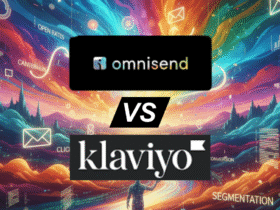

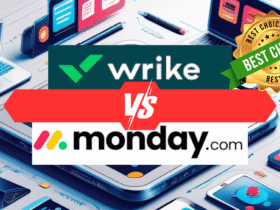
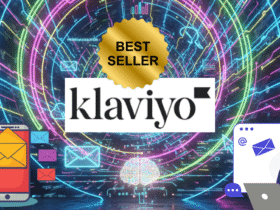

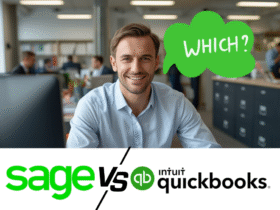
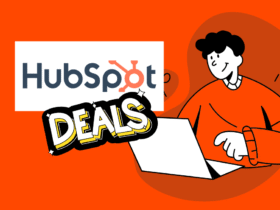

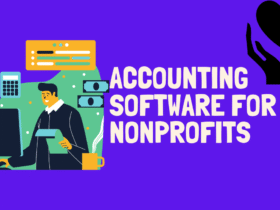
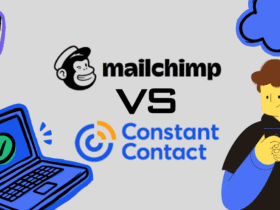

1 Comment